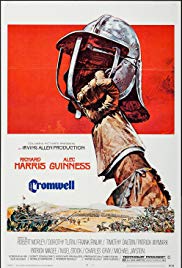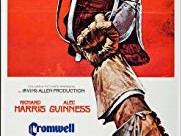Cromwell *** (1970, Richard Harris, Alec Guinness, Robert Morley, Dorothy Tutin, Frank Finlay, Timothy Dalton) – Classic Movie Review 9192

Writer-director Ken Hughes’s 1970 British historical drama Cromwell is an interesting version of how the 17th-century Puritan squire Oliver Cromwell became a member of the English Parliament, and then seized power as a dictator.
The movie is enriched with fine performances headed by Richard Harris, who seems risky casting but who is restrained and very tolerable in the title role, and Alec Guinness, who is fussy and fascinating as the king, Charles I.
Rousing fighting sequences, Oscar-winning costumes (designed by Vittorio Nino Novarese) and a tasty support cast bring warmth to this beautifully filmed, lavish British epic. It really is very involving for what amounts to a history lesson. It may not be a great film, but the performances. production, costumes, score and cinematography are all impeccable and admirable.
It also stars Robert Morley as the Earl of Manchester, Dorothy Tutin as Queen Henrietta Maria, Frank Finlay as John Carter and the 24-year-old Timothy Dalton as Prince Rupert of the Rhine.
It can boast quite an A-Z of British Equity of the era. Also in the cast are Patrick Wymark, Patrick Magee, Nigel Stock, Charles Gray, Michael Jayston, Richard Cornish, Anna Cropper, Michael Goodliffe, Jack Gwillim, Basil Henson, Patrick Holt, Stratford Johns, Geoffrey Keen, Anthony May, Ian McCulloch, John Paul, Bryan Pringle, Zena Walker, John Welsh, Douglas Wilmer and George Merritt.
The film received two Oscar nominations at the 1971 43rd Academy Awards, winning for Best Costume Design by Vittorio Nino Novarese, but losing for Best Original Score by Frank Cordell. It won the award for Best Actor (Richard Harris) at the 7th Moscow International Film Festival in 1971.
Italian costume designer Vittorio Nino Novarese scored an Oscar nomination for Prince of Foxes, winning the Academy Award 14 years later for Cleopatra. He was also nominated twice in 1965 for The Agony and the Ecstasy and The Greatest Story Ever Told, and won his second Oscar in 1970 for Cromwell.
The production dates back a whole decade to 1960, when Hughes read John Buchan’s biography Oliver Cromwell and toured England to research from historic sites, museums and archives. In September 1960, Warwick Productions purchased the screen rights to Buchan’s book and Hughes was announced as writer and director. Finally, in February 1969, it was announced Hughes would write and direct for Irving Allen Productions, with finance from from Columbia Pictures.
Most of the film is shot in England but the battle scenes are shot in Spain.
Hughes cut it back from 195 minutes to 140 minutes.
The budget rose from $6 million to $9 million.
© Derek Winnert 2019 Classic Movie Review 9192
Check out more reviews on http://derekwinnert.com


